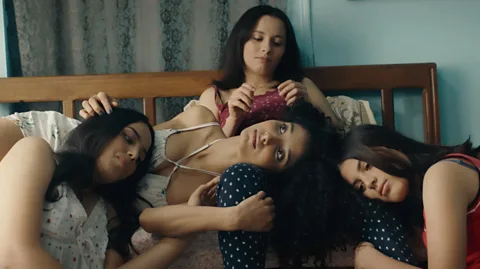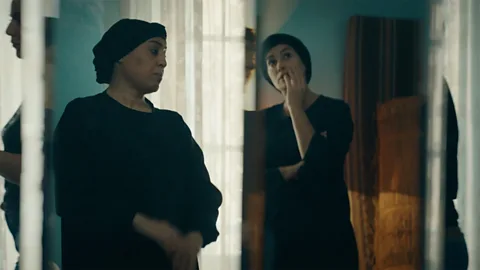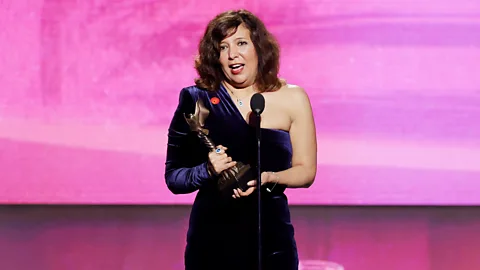By Emma JonesFeatures correspondent

 Twenty Twenty Vision
Twenty Twenty Vision
Kaouther Ben Hania is up for an Oscar for her documentary about Ghofrane and Rahma Chikhaoui, exploring a disturbing history of radicalisation and generational trauma.
Rahma and Ghofrane Chikhaoui look very young in the photos shown of them in the documentary Four Daughters. All that’s visible of them are their teenage faces, swathed in black hijabs. They were around 15 and 16 years old respectively when the young Tunisian women became involved with the Islamic State group (IS), which is categorised as a terrorist group by the British government (among others). Their fate, the documentary director Kaouther Ben Hania tells the viewer, was “to be devoured by the wolf” – a reference to the fairy tale Little Red Riding Hood.
More like this:
– The Oscar nominee wading into the US culture wars
Four Daughters has garnered Tunisian filmmaker Ben Hania her second Oscar nomination, this time in the documentary category (her first was in the international film category in 2021 for the drama The Man Who Sold His Skin, about a Syrian refugee who sells himself for art in return for a Schengen visa).
In Four Daughters, the story of Ghofrane and Rahma Chikhaoui, their younger sisters Eya and Tayssir and their mother Olfa, is told through remembering the events that led to the older sisters joining IS. It reveals a fascinating and disturbing history of generational female trauma, intertwined with the history of Tunisia itself.
To begin with, Ben Hania says, she was interested by what might motivate a young woman to join group like IS. “We’re used to men doing this and it’s quite new that women are also involved with terrorism. I think I wanted to understand why young women are attracted to this,” she tells BBC Culture. “One of the ideas that I found very counterintuitive is that Ghofrane and Rahma were looking for freedom. They wanted to break free from the oppression of their mother. They wanted to prove to their mother and to their father that they were worthy. So, it’s mind-blowing for me to understand that a desire for freedom and for another horizon can lead you there.”
There are many photos of young women like the Chikhaoui sisters, who ran away to join IS during the height of the group’s acts of terror and occupation. A 2018 report from King’s College London estimated that 4,761 female foreign citizens were linked to IS activities in Iraq and Syria between 2013 and 2018.
You have the headlines, but what’s behind the headlines? For this, you need time, and that’s why you have cinema – Kaouther Ben Hania
Like Ben Hania, the media is also interested in the idea of the female terrorist – and those who join such groups can be judged as harshly as their male peers. A London teenager, Shamima Begum, who joined IS as a 15-year-old, was recently stripped of her British citizenship, although her lawyers had appealed on the basis that she had been groomed by IS. “You have the headlines,” Ben Hania says. “But what’s behind the headlines? For this, you need time, and that’s why you have cinema.”
What’s memorable about Four Daughters is the way Ben Hania gets to the root of why the Chikhaoui sisters made these choices. As well as asking the girls’ mother, Olfa Hamrouni, to participate, and the two younger daughters, the director asked two actresses, Ichrak Matar and Nour Karoui, to play the parts of Ghofrane and Rahma, and Tunisian-Egyptian star Hend Sabry to play Olfa when memories might become too distressing for her. One Tunisian actor, Majd Mastoura, plays all the male characters, a dramatic device adopted to let the female characters stand out.
A tragic cycle of abuse
Ben Hania stresses the film isn’t a docudrama or reminiscent of a documentary such as Joshua Oppenheimer’s 2012 Oscar-nominated The Act of Killing, which asked former Indonesian death-squad leaders to re-enact their crimes. “Despite the fact you have actors, the acting parts are very small in the film and the actors are acting as a person, they’re sharing their thoughts and their questions with Olfa and her two daughters. Maybe we can call it a meta documentary because it’s a movie about a movie being done about actors and real characters,” she suggests.
“I started by shooting a fly-on-the-wall documentary, but I quickly realised that it wasn’t interesting, I need more to dig deep into this story, so I borrowed tools from fiction, from cinema mainly, to go further and to tell this story in a better, deeper way. “I brought actors to Olfa and to the two youngest daughters, the real characters, so they can direct the actors to remember their memories and what happened. It’s a dialogue, you see, between actor and real character. It’s the story of transmission, from mother to daughter, transmission of violence, and what the mother calls ‘malediction’.”

 Twenty Twenty Vision
Twenty Twenty Vision
What’s apparent from the film is that Olfa Hamrouni suffered abuse as a young woman, recalling that as a teenager she tried to protect her own mother and sisters from sexual violence, hitting out herself. When she married her daughters’ father, she recalls her own sister urging the bridegroom to treat Olfa roughly to get the marriage consummation over and done with. But Olfa punched the groom and used that blood to stain the sheets that were supposed to signify that sex had taken place. Later Olfa, now bringing up her daughters alone, would become violent with her girls, out of fear that they would become what’s referred to in the film as “sluts”; when Ghofrane dyed her hair and shaved her legs, Olfa recalls beating her. By the end of the film, Olfa tells Kaouther Ben Hania that she is like the cat, “who out of fear for her babies, eats them. I was so afraid for them, I was unable to protect them. I didn’t eat them, but I lost them”.
“Olfa refers to this generational cycle in the film as ‘the curse’,” Ben Hania explains. “So, what she went through as a child and teenager, she did exactly the same to her daughters. She understood during the movie what was happening with her and how this inheritance of trauma affected her daughters also. But what is great is that at one point the actors also tell her, ‘We all do this. We transfer to our daughters what we inherit from our mothers, and then we finally arrive at the generation that says, stop. We don’t want this anymore.’ The eldest daughters had a very violent reaction and said no to this cycle, and maybe the two youngest will be saved. They’re the hope in this film.”
I think what radicalisation at least offered them is they could reverse the power dynamic with their mother – Ben Hania
Perhaps what partly motivated Ghofrane and Rahma to first wear hijabs and then niqabs (which, according to the film, were rarely used in public before the 2011 Tunisian Revolution) was to seek safety from their mother, but as they became radicalised further, Ben Hania suggests it was a way of them asserting authority over her. “I think what radicalisation at least offered them is they could reverse the power dynamic with their mother. They can lecture their mother, they can lecture the people lecturing them about their sexuality,” she points out.
“I think that what is paradoxical in this story, is that the patriarchy is not all the men played by Majd Mastoura, but that someone like Olfa was the guardian of the patriarchy. She was the one putting pressure on her daughters. And since they were beautiful girls, they almost had to refute that they’d turn bad or become ‘sluts’, as it’s said in the movie. When you have this perpetual accusation, because you are women, you have to find a way to defend yourself.”

 Getty Images
Getty Images
Ben Hania agrees that Ghofrane and Rahma were also teenagers during a period that was ripe for them to be radicalised. After the instability of the Tunisian Revolution in 2011 and the rise of the Islamic State group, many Tunisians became attracted by the idea of joining the group in Libya, Iraq or Syria. Up to 6,000 Tunisians were estimated to have joined IS by 2015. “I think about that quote from Italian philosopher Antonio Gramsci, that ‘the old world is dying, the new world struggles to be born; now is the time of monsters,”http://www.bbc.com/” she says.
“He was talking about Europe between two worlds, but it could be said too about the Arab Spring and the rise of Islamic State. In the twilight, you have monsters. The Revolution, the Arab Spring, shook the dictatorships in the region, but also the new world, the fruit of this revolution, freedom and democracy, they weren’t there yet. So, you have all these monsters playing while the new world is late to arrive. Olfa’s daughters were in this place with monsters.”
Ghofrane and Rahma Chikhaoui’s names made headlines in Tunisia in 2015 when it emerged that they had joined IS; Olfa would also appear on Tunisian television saying that she’d warned the authorities that that her daughters were being radicalised (she had even requested that they’d lock Rahma up, to prevent her from running away.) They would later be captured in Libya, and in 2023 were sentenced to 16 years in prison. Ghofrane’s eight-year-old daughter Fatma is growing up in a Libyan prison with her mother.
Ben Hania reports that her film is still playing in cinemas in Tunisia, nearly six months after its release. However, plans to either allow the sisters to come and stand trial in Tunisia, or to allow Fatma to leave prison, have so far not been successful. Perhaps most moving in Four Daughters, which sums up the history of family trauma revealed by the documentary, is when Eya Chikhaoui is asked what she’d say to her sisters if she could see them again.
“This family that has destroyed you, I won’t let it destroy me,” she says.
Four Daughters is on release now; the Academy Awards take place on 10 March 2024.
If you liked this story, sign up for The Essential List newsletter – a handpicked selection of features, videos and can’t-miss news delivered to your inbox every Friday.
If you would like to comment on this story or anything else you have seen on BBC Culture, head over to our Facebook page or message us on Twitter.





